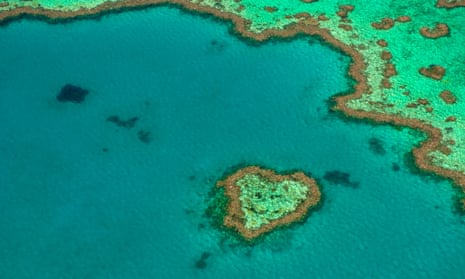The Queensland government may adopt tough new regulations to tackle the amount of pollution flowing onto the Great Barrier Reef, with the state’s first ever reef minister vowing to strengthen protections to avoid the ecosystem being listed as “in danger” by the UN.
The new Labor government has promised to slash the amount of nitrogen flowing on to the reef from key catchments by 80% by 2025, while also cutting total suspended sediment reaching the reef by 50% by the same year.
While some progress has been made in encouraging farmers to change practices to stop harmful chemicals running off their land on to the reef, Labor has indicated new regulations may be introduced to achieve its targets.
“I don’t want to pre-empt any discussions but there are a range of levers available, from regulation to education to innovation and we’ll be looking to all of those to make sure it works,” Steven Miles, Queensland’s newly-appointed environment minister told Guardian Australia. Miles has also been given the new title of minister for the Great Barrier Reef.
“It’s certainly a big job to achieve those ambitious targets and we need to find ways to do it,” Miles said. “We are working out the details now. But we will work with all the stakeholders involved.
“We think there needs to be a substantial improvement in the quality of water running into the world heritage area. I don’t want to disparage previous efforts on this, but we want to really aggressively reduce run-off.”
Unesco’s world heritage committee will meet in June to decide whether to list the reef, which is in declining health, as “in danger”. Miles said he would ensure Labor’s new reef policies will be submitted to the UN this month for consideration.
“The in-danger listing is a real possibility, it’s something we’re concerned about,” he said. “It’s not just the optics of it, but the fact the reef will actually be in danger. Our approach will be guided by the science to convince the scientists at the world heritage committee that we have a strong plan.”
A federal government-commissioned report last year warned while a voluntary approach to reducing pollution had worked with some land managers, there is no “urgent reason for action” for those who don’t want to take part.
“It is widely acknowledged that agricultural land use in catchments that drain into the Great Barrier Reef is largely ungoverned by the suite of legislative and regulatory arrangements in place,” the report states.
While the previous Liberal National party government stressed it was spending $35m a year to improve water quality, its scientists reportedly warned that the reliance on voluntary schemes had proven ineffective, with the amount of pesticides flowing on to the reef causing feminisation in some male fish.
Chemicals such as nitrogen are also thought to spur the growth of crown-of-thorns starfish, which eat their way through reef systems.
According to the federal government, around half of horticulture and cane growers are improving their practices, with the sediment load falling by 11% in the past five years.
Labor has promised $100m to improve water quality over the next five years, although this is far short of the amount required, according to the groups that oversee the catchments flowing onto the reef.
The new state government has also pledged to halt the dumping of dredged sediment in the reef’s world heritage area, as well as scrap an LNP plan to dump spoil from the expanded Abbot Point port on to the nearby Caley Valley wetlands, which is regarded as nationally significant area for wildlife.
Adani, the Indian mining firm that wants to create Australia’s largest mine and ship the coal from Abbot Point, is keen to press ahead with the dredging, but the process will be delayed until a new dumping site is found.
“The dumping had to stop now as the plan for proponents of the Abbot Point coal terminal was to be dredging in March, which was a very imminent threat,” said Miles. “They certainly won’t be dredging in March. We are looking for an environmentally responsible place to put it.
“We are committed to working with the business community to deliver economic growth but people clearly voted for a government that won’t dump spoil on sensitive wetlands. We were elected on that platform and we have to work out other options, but I won’t put timelines on that.”
Miles said he was “clearly concerned” about climate change, which has been cited by the Great Barrier Reef Marine Park Authority as the leading long-term challenge for the reef, but that water quality and dumping are the two most immediate threats to the ecosystem.
The new environment minister said a commission will be set up to assess feed-in tariffs for solar energy, in order to meet a Labor goal of one million solar rooftops by 2020.
Separately, Labor has committed to banning uranium mining in Queensland, while Miles said he’d have “serious concerns” about any proposal to dump nuclear waste in the state.
Dermot O’Gorman, chief executive of WWF Australia, said it was an “important signal” that Queensland now has a minister for the Great Barrier Reef and that the new protections for the reef were “urgent”.

Comments (…)
Sign in or create your Guardian account to join the discussion